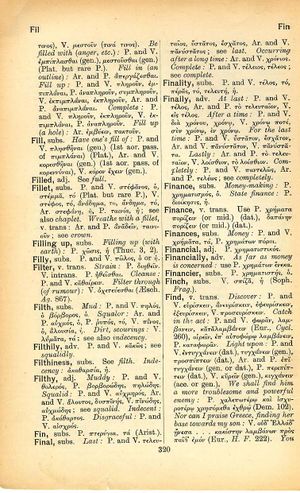find: Difference between revisions
Πρὸς υἱὸν ὀργὴν οὐκ ἔχει χρηστὸς πατήρ → Boni parentis ira nulla in filium → Ein guter Vater zürnt nicht gegen seinen Sohn
m (Woodhouse1 replacement) |
mNo edit summary |
||
| Line 7: | Line 7: | ||
[[catch in the act]]: [[prose|P.]] and [[verse|V.]] [[φωρᾶν]], [[λαμβάνω]], [[λαμβάνειν]], [[καταλαμβάνειν]] ([[Euripides|Eur.]], ''[[Cyclops]]'' 260), [[αἱρεῖν]], [[ἐπ' αὐτοφώρῳ λαμβάνω]], [[ἐπ' αὐτοφώρῳ λαμβάνειν]], [[prose|P.]] [[καταφωρᾶν]]. | [[catch in the act]]: [[prose|P.]] and [[verse|V.]] [[φωρᾶν]], [[λαμβάνω]], [[λαμβάνειν]], [[καταλαμβάνειν]] ([[Euripides|Eur.]], ''[[Cyclops]]'' 260), [[αἱρεῖν]], [[ἐπ' αὐτοφώρῳ λαμβάνω]], [[ἐπ' αὐτοφώρῳ λαμβάνειν]], [[prose|P.]] [[καταφωρᾶν]]. | ||
[[light upon]]: [[prose|P.]] and [[verse|V.]] [[ἐντυγχάνειν]]; (dat.), [[τυγχάνειν]] (gen.), [[προσπίπτειν]] (dat.), [[Aristophanes|Ar.]] and [[prose|P.]] [[ | [[light upon]]: [[prose|P.]] and [[verse|V.]] [[ἐντυγχάνειν]]; (dat.), [[τυγχάνειν]] (gen.), [[προσπίπτειν]] (dat.), [[Aristophanes|Ar.]] and [[prose|P.]] [[ἐπιτυγχάνειν]] (gen. or dat.), [[prose|P.]] [[περιπίπτειν]] (dat.), [[verse|V.]] [[κυρεῖν]]; (gen.), [[κιγχάνειν]] (acc. or gen.), | ||
[[we shall find him a more troublesome and powerful enemy]]: [[prose|P.]] [[χαλεπωτέρῳ καὶ ἰσχυροτέρῳ χρησόμεθα ἐχθρῷ]] ([[Demosthenes|Dem.]] 102). | [[we shall find him a more troublesome and powerful enemy]]: [[prose|P.]] [[χαλεπωτέρῳ καὶ ἰσχυροτέρῳ χρησόμεθα ἐχθρῷ]] ([[Demosthenes|Dem.]] 102). | ||
Revision as of 08:17, 6 June 2020
English > Greek (Woodhouse)
verb transitive
discover: P. and V. εὑρίσκειν, ἀνευρίσκειν, ἐφευρίσκειν, ἐξευρίσκειν, V. προσευρίσκειν.
catch in the act: P. and V. φωρᾶν, λαμβάνω, λαμβάνειν, καταλαμβάνειν (Eur., Cyclops 260), αἱρεῖν, ἐπ' αὐτοφώρῳ λαμβάνω, ἐπ' αὐτοφώρῳ λαμβάνειν, P. καταφωρᾶν.
light upon: P. and V. ἐντυγχάνειν; (dat.), τυγχάνειν (gen.), προσπίπτειν (dat.), Ar. and P. ἐπιτυγχάνειν (gen. or dat.), P. περιπίπτειν (dat.), V. κυρεῖν; (gen.), κιγχάνειν (acc. or gen.),
we shall find him a more troublesome and powerful enemy: P. χαλεπωτέρῳ καὶ ἰσχυροτέρῳ χρησόμεθα ἐχθρῷ (Dem. 102).
nor can I praise Greece, finding her base towards my son: V. οὐδ' Ἑλλάδ' ᾔνεσα… κακίστην λαμβάνων πρὸς παῖδ' ἐμόν (Eur., Hercules Furens 222).
you yourself would find the Achaeans kinder: V. αὐτή τ' Ἀχαιῶν πρευμενεστέρων τύχοις (ἄν) (Eur., Troades 734) (same construction Plato Charm. 175C).
I found you the dearest of my friends: V. ἐμῶν γὰρ φίλτατον σ' ηὗρον φίλων (Eur., I.T. 708).
be found, prove oneself: P. and V. φαίνω, φαίνεσθαι; see under prove.
find (money, etc.), provide: P. and V. παρέχω, παρέχειν (or mid.), πορίζειν (or mid.); see provide.
deliver a verdict: P. and V. κρίνειν, δικάζειν; see decide.
find fault: Ar. and P. σχετλιάζειν.
find fault with; see blame.
find guilty P. and V. αἱρεῖν, καθαιρεῖν.
be found guilty: P. and V. ἁλίσκεσθαι.
solve (a riddle): P. and V. λύω, λύειν, V. διειπεῖν; see solve.

